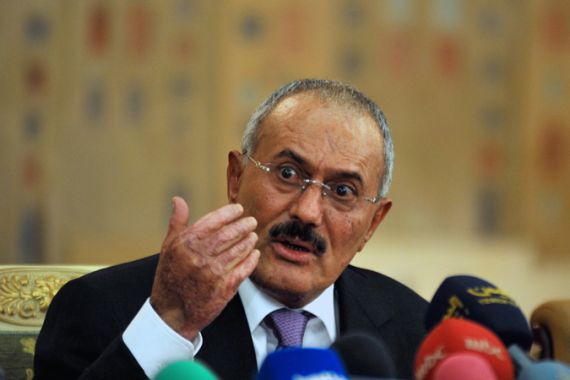Yemen parliament approves immunity law
Law, passed unanimously, gives the outgoing president immunity from prosecution in return for his stepping down.

 |
| Yemenis have been regularly taking to the streets to call for President Ali Abdullah Saleh to be put on trial [AFP] |
The Yemeni parliament has unanimously approved a law giving the country’s outgoing president immunity from prosecution in return for his stepping down under a Gulf-brokered transition deal.
The law, adopted on Saturday, gives Ali Abdullah Saleh “complete” immunity and also offers partial protection from legal action to his aides.
The transitional government of national unity, which is led by the parliamentary opposition, had submitted eleventh-hour amendments on Friday, sharply reducing the scope of the amnesty offered to Saleh’s lieutenants following a public outcry.
The immunity, which was a crucial element of the hard-won Gulf Arab deal that Saleh signed in November, had been condemned by US-based Human Rights Watch as a “licence to kill” and criticised by protesters and the UN.
Rights groups say hundreds of protesters were killed by security forces since the uprising began in February 2011, which was punctuated by bursts of street fighting between Saleh loyalists and their foes.
The immunity would cover the 33-year period of Saleh’s presidency and could not be cancelled or appealed against.
It also shields his aides from prosecution over “politically motivated” crimes committed whilst conducting official duties, except those considered “terrorist acts”.
Al-Qaeda fears
The latest development came a day after post-prayer protests in the southern city of Taiz broke out against the immunity law. Taiz is considered the second most important protest city after Sanaa.
The US and neighbouring Saudi Arabia were keen for the plan to work, fearing that protracted political upheaval will let al-Qaeda’s regional Yemen-based wing establish a foothold along oil-shipping routes through the Red Sea.
Already, a suspected al-Qaeda-linked group that took over Radda, a small town in Yemen about 170km southeast of Sanaa, has said it is closing in on the Yemeni capital.
Tareq al-Dahab, the Ansar al-Sharia chief, is related to Anwar al-Awlaki, a US citizen who was accused by the US of a leadership role in the Yemeni branch of al-Qaeda and who was assassinated in a drone strike last year.
The fighters swept up from the southern and eastern provinces last week – to within just a few hundred miles of Sanaa.
While the government in Sanaa has been preoccupied with steering Yemen towards elections scheduled for February, the fighters are taking advantage of the political instability.
Al-Dahab has released a video online, repeating demands for jailed members of his group to be freed.
Tribesmen negotiating with the group on behalf of the government said the fighters agreed to leave if their leader’s brother and several others were freed.
The group is also promising that the town, and the country, will soon be under strict Islamic law.
However, not all the locals are happy to see the group.
The political opposition blames the government for losing control of the security situation, and despite earlier indications that the elections might be postponed, the government says it is sticking to the timetable.
Yemen’s foreign minister says a presidential election will be held as scheduled.
In a statement released on Wednesday, Abu Bakr al-Qirbi, Yemen’s foreign minister, said his government was committed to holding presidential elections on February 21.